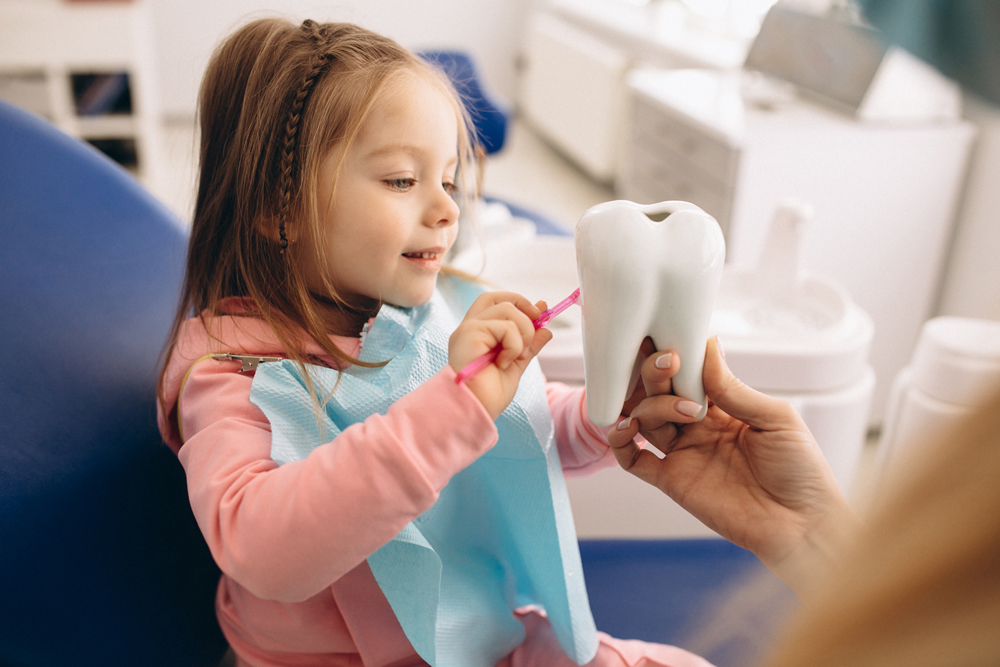Pedodontics (Pediatric Dentistry)





Pedodontics (Pediatric Dentistry)
Pedodontics is a dentistry specialty that aims to protect the oral and dental health of individuals between the ages of 0-13.
Pedodontics (Pediatric Dentistry)
Pedodontics is a Latin word meaning pediatric dentistry. Pedodontists aim to protect the milk teeth and permanent teeth of children aged 0-13 years in a healthy way and to provide treatment in case of any damage.
Treatment and Preventive Practices Applied by Pedodontists
Treatment and Preventive Practices Applied by Pedodontists
After the 5-year undergraduate education given in the Faculties of Dentistry, dentists who have received specialization or doctorate training in the Pedodontics Department of the same faculties are given the title of pedodontist or pediatric dentist.
We can list some of the treatments and preventive practices applied by pedodontists as follows:
- Teaching the oral and dental care to the child and sticking to the follow-up of the application.
- Nutrition recommendations.
- Tooth extraction.
- Protective and preventive applications from dental caries (fluoride gel, fluoride varnish, fissure sealant)
- Treatment of dental traumas.
- Applying treatments to stop bad oral habits such as thumb sucking, nail biting, lip biting.
- Restorative (filling) treatments in milk and newly erupted young permanent teeth.
- Space maintainer placement (preserving the position of prematurely lost milk teeth, thus preventing the other teeth from slipping into that area)
- Application of endodontic treatments (CANAL treatment applications).
- Checking the regular progress of jaw and tooth development.
Milk Teeth
Milk Teeth
Baby teeth begin to erupt when your baby is 6-8 months old, and they complete their formation at around 2.5 years of age, that is, at about 30 months. With the development of permanent teeth, the milk teeth, which are 20 in total, lose their roots and fall by shaking or are removed by pulling. Deciduous teeth that change due to permanent teeth that develop between the ages of 6-7 should have completely changed by the age of 12.
Symptoms of the eruption of milk teeth
Symptoms of the eruption of milk teeth
You may observe some general and regional changes in your baby during the period when milk teeth begin to erupt. These are loss of appetite, weight loss due to anorexia, diarrhea, increased salivation, restlessness, mild fever, itching and redness of the gums. Although there is no treatment method for these findings, your pedodontist may recommend tooth gel and some anti-itch syrups to provide comfortable nutrition and relieve pain.
Importance of Milk Teeth
Importance of Milk Teeth
The most important task of the milk teeth, which are 20 in total, is to ensure the nutrition of the child. The proper development of speech is also possible with the presence of milk teeth. The milk teeth, which are in the position of temporary teeth, also guide the permanent teeth coming from behind. For this reason, it is important for families to cooperate with a pedodontist from the beginning of tooth eruption in children.
Treatments Performed by the Pedodontics Department
Treatments Performed by the Pedodontics Department
The treatments performed by pedodontists in the pedodontics department are as follows:
- Preventive Treatments
These are the treatments applied in the pedodontics department in order to eliminate the risk of dental caries and deterioration of tooth alignment. There are applied in 3 ways
- Fissur sealant: Food residues may remain in the recessed structures on the posterior teeth and can be very difficult to clean, especially for children. Leftover food residues can also cause cavities. In order to prevent this, it is the process of covering these parts of the teeth with a special filling material.
- Fluoride Treatment: Fluoride is a substance required for the outer structure of the tooth, which we call enamel, to be strong and more resistant to caries. According to the needs of the teeth, topical gel application is made in 12-24 week periods.
- Space Matintainer Treatment: If the milk teeth fall out before the expected time, when the permanent teeth come out, the permanent teeth may be deformed. To prevent this, the apparatus called placeholders protect the tooth space and prevent a defect in the tooth alignment.
- Medication
In case of infection in the dental pulp or gums, drug treatment may be recommended by the pedodontist. Antibiotics, pain relievers, and mouthwash may be prescribed.
- Root Canal Treatment
Although the milk teeth are not permanent, if they cause a caries tissue when they leave the mouth, they should be cleaned and a healthy infrastructure should be prepared.
In the light of all that we have said, we can say that the pedodontics department and pedodontists aim to eliminate possible problems during infancy and childhood and to offer a trouble-free future so that the individual can have a strong oral and dental health in adulthood.
Pedodontist and Child Relationship
Pedodontist and Child Relationship
Pedodontists establish good communication with children and their families and ensure that both the child and their parents are conscious about oral and dental health. In order that the child does not have any fear of the dentist, they get used to the dentist's chair by establishing a bond with the child through playgrounds and interesting small activities.
Pedodontists, who act according to child psychology, approach children in a soft way and lay the foundations for children to get used to dental checks and treatments, to be informed about dental care and to have healthy teeth for the future.
Would you like to book an appointment?
Book Appointment





